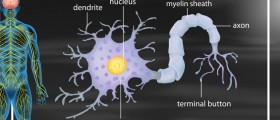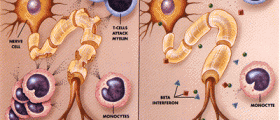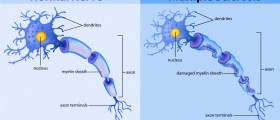
Multiple Sclerosis Overview
Multiple sclerosis (MS) is a disease of the central nervous system that leads to deterioration of the nerves. Multiple sclerosis is an autoimmune disorder, featured by process of demyelination, in which body’s immune system attacks protective sheath of nerves, called myelin. As myelin sheath gradually disappears, the nerves become unable to transmit electrical impulses, which lead to disrupted communication between the brain and the rest of the body.
When nerve impulses are obstructed certain functions diminish. The disease slowly damages the nerves as well. MS is also characterized by an increased number of lymphocytes in the spinal fluid and increased number of T cells in the blood. Multiple sclerosis is a progressive disease accompanied by a variety of symptoms related to speech, vision, mobility and memory. Common symptoms of multiple sclerosis include: numbness, tingling, muscle weakness, muscle spasms, tremor, double vision, blurred vision, slurred speech, difficulty swallowing, loss of balance, pain, fatigue, dizziness, incontinence, memory problems, depression, paranoia and others.
In a severe case of multiple sclerosis, affected person loses ability to walk, speak and see, and becomes completely dependent on others. Multiple sclerosis is an incurable disease but the symptoms can be relieved with an adequate treatment. The cause of the disease is unknown but women are twice as likely as men to be affected by the disease.
Pregnancy and Multiple Sclerosis
Women affected by multiple sclerosis do not have to avoid pregnancy. The disease does not interfere with the course of pregnancy and labor and there is no evidence that it increases the risk of miscarriages, stillbirths or fetal complications. Actually, symptoms of multiple sclerosis usually remit during gestation period, especially in second and third trimester. Reduction in number of the relapses is reported by many women with multiple sclerosis who have been pregnant. It is believed that this improvement occurs due to the hormonal changes that take place as women conceive. Pregnancy hormones suppress mother’s immune system to prevent rejection of the fetus and it is considered to be the reason for the improvement of the disease.
However, certain medications for treating multiple sclerosis should not be taken during pregnancy and while breast feeding due to possible congenital defects. This include: Prednisone, corticotrophin, azathioprine, cyclophosphamide, diazepam, phenytoin, carbamazepine and baclofen. Women with multiple sclerosis also do not require special treatment during labor. Any form of pain relief like epidural or general anesthesia can be administered. But, those women who are paralyzed or lack sensation due to their disease, may not feel contractions thereby need to be observed during last four gestation weeks. In the first six months of postpartum period, women have 20% to 40% higher risk of relapse. But, in general, it appears that the pregnancy does not affect the long-term course of multiple sclerosis and there is no reason for women with the disease to avoid giving birth.

















Your thoughts on this
Loading...